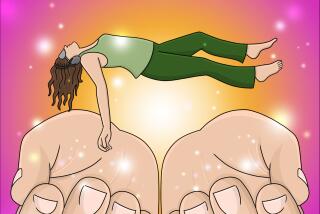New therapies offer bright hope against the darkness of depression
- Share via
The numbers are staggering: Almost 7% of the U.S. adult population — about 17.6 million people — is diagnosed with depression, according to the National Institute of Mental Health. The national Centers for Disease Control and Prevention report that depression costs 200 million lost workdays each year at a cost to employers of $17 billion to $44 billion.
There are effective treatments for depression, including, researchers said recently, meditation. But neither talk therapy nor the existing medications work for everyone. And it can take up to six agonizing weeks for the most common antidepressants — Prozac, Zoloft and Lexapro — to work fully.
Additionally, estimates are that only about half of people with depression seek treatment.
The good news is that there is much work in progress, says Dr. Jeffrey Borenstein, head of the New York-based Brain & Behavior Research Foundation.
Here’s some of what’s ahead or under study:
Vortioxetine
The federal government recently approved vortioxetine for the treatment of adults with major depressive disorder. The commercial name of vortioxetine, a variant on serotonin reuptake inhibitors that are the mainstay of depression treatment, is Brintellix.
Research on rats, submitted by the drug developer to U.S. regulators, suggested the drug may improve some dimensions of memory. A trial in human subjects showed that those taking it had better cognitive function than those taking duloxetine, which is marketed as Cymbalta. The government declined to approve those claims until they were replicated and extended by additional research.
Ketamine
Ketamine is an anesthetic used in human and veterinary medicine, and its ability to rapidly reduce depressive symptoms in people who have responded insufficiently to antidepressants has generated great interest in the scientific and clinical communities. A study of 72 patients, presented last year at the American Psychiatric Assn. annual meeting, found that more than half reported fewer symptoms after one intravenous dose of ketamine.
Ketamine, a legal drug but not federally approved to treat depression, not only works quickly but its effects also can last three to five days or more, said Dr. Carlos Zarate, chief of the section on the neurobiology and treatment of mood disorders at the National Institute of Mental Health.
Those qualities mean it could be useful for patients in danger of committing suicide, Zarate said.
Ketamine’s side effects include hallucinations, and several pharmaceutical companies are working on ketamine-like alternatives, he said, adding that he expects such drugs on the market by 2017.
Transcranial magnetic stimulation
TMS administers brief, magnetic pulses to the brain by passing high currents through an electromagnetic coil adjacent to a patient’s scalp. The targeted magnetic pulses stimulate the circuits in the brain that are underactive in patients with depression with the goal of restoring normal function and mood. TMS can be administered on both an inpatient and outpatient basis.
TMS was cleared by the U.S. Food and Drug Administration to treat major depressive disorder in adults for whom medication did not work. For most patients, treatment is administered daily for four to six weeks, 40 minutes a session.
Cranial electrotherapy stimulation
CES involves small, hardly noticeable, electric current pulsed across the patient’s head in a device that can be used at home. One on the market is the Fisher Wallace Stimulator, a portable, battery-powered generator cleared by the FDA for symptomatic relief of insomnia, anxiety and depression, and for treating chronic pain.
Deep brain stimulation
This surgically implanted, battery-operated neuro-stimulator, the size of a stopwatch and similar to a heart pacemaker, is used to treat a variety of neurological symptoms, especially those resulting from Parkinson’s disease. Small trials are being conducted, mostly in Europe, to learn its effectiveness in depression, said Dawn Tartaglione, a neurosurgeon who works for Integris Health, a healthcare company based in Oklahoma City.
ALSO:
Bill Nye tests the benefits of swing dancing
Soak your cares away — it’s terrific and scientific
L.A. Walks: For a trail with pleasing flow, hit Paradise Falls in Thousand Oaks






